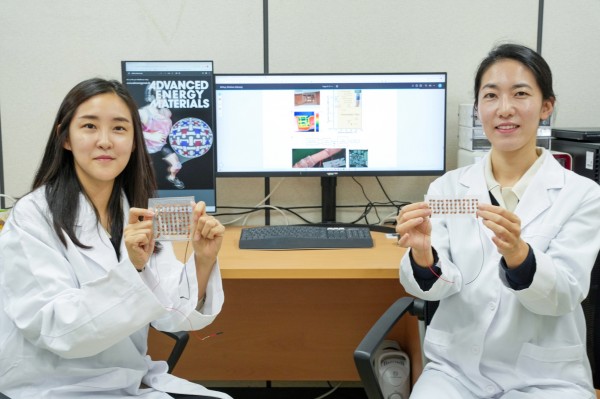Newswise — A team of Dr. Hyekyoung Choi and Min Ju Yun of Energy Conversion Materials Research Center, Korea Electrotechnology Research Institute (KERI) has developed a technology that can increase the flexibility and efficiency of thermoelectric generator to the world’s highest level by using ‘mechanical metamaterials’ that do not exist in nature.
In general, a material shrinks in the vertical direction when it is stretched in the horizontal direction. It is like when you press a rubber ball, it flattens out sideways, and when you pull a rubber band, it stretches tightly. The amount of transversal elongation divided by the amount of axial compression is ‘Poisson’s ratio.’ Conversely, mechanical metamaterials, unlike materials in nature, are artificially designed to expand in both the horizontal and vertical directions when it is stretched in the horizontal direction. Metamaterials have a negative Poisson’s ratio.
KERI succeeded in increasing the stretchability of thermoelectric generators by up to 35%, using a ‘gasket*’ with the metastructure. A thermoelectric generator converts the temperature difference between two ends into electrical energy. It is called a next-generation eco-friendly energy harvesting device as it can utilize heat wasted in daily life as electricity.
* Gasket: A type of packing inserted to prevent gas or water from leaking from the contact surface
Until now, most thermoelectric generators used hard ceramic PCB making it difficult to apply them to curved surfaces such as skin or hot water pipes. To solve this problem, flexible materials such as silicon and polymers were adopted as supporters, but high thermal conductivity was the problem. The greater the temperature difference between the boundaries of each material, the higher the efficiency of thermoelectric generators, but the typical flexible supporters cause thermal bypass and prevent large temperature gradients due to subsequent heat loss. In other words, it is important for thermoelectric generators to be flexible, elastic, and at the same time efficient.
The deformable gasket used by Dr. Hyekyoung Choi’s team has a metastructure, which greatly increases the structural stability of the thermoelectric generator. It can be transformed into various shapes, stretches well like human skin, and is easy to attach anywhere. In addition, the partial air-gap inside the gasket has excellent insulating properties, preventing heat loss and securing the efficiency of the thermoelectric generator by increasing the temperature difference by up to 30% compared to existing flexible thermoelectric generators.
KERI’s thermoelectric generators are up to 35% or more stretchable, and the power production density is more than 20 times higher (0.1μW/cm2 ⇒ 2~3μW/cm2). Even if the thermoelectric generator module is greatly expanded, there is almost no deterioration in electrical characteristics. This stretchability and efficiency are the highest level in the world. The research team achieved durability that allows the generator to maintain its performance without loss even after 10,000 or more repeated bending.
Dr. Hyekyoung Choi of KERI said, “Researchers in the team not only have the know-how to develop high-performance thermoelectric materials, but also have modularization technology dedicated to energy harvesting and technology related to stable self powered devices,” adding, “With such convergence research, we were able to create synergy and consider everything from core technology development, testing to real-life applications.”
This achievement is expected to receive great attention in the field of IoT and AI-based wearable devices. Existing wearable devices had the disadvantage as it had to have a separate power supply such as a battery, but with KERI thermal energy harvesting technology, they can simply be attached to the body to produce electricity using body heat, and even supply power directly through the module. It can also be applied to the next-generation medical field.
The research results were recently published as an inside front cover article in the prestigious international journal “Advanced Energy Materials” in the field of energy, having been recognized for their excellence (Impact Factor 27.8 / JCR top 2.5%). Dr. Hyekyoung Choi’s team aims to advance the era of next-generation eco-friendly energy harvesting through continuous research and development, improving cooling technology and power management circuits that can advance the performance of thermoelectric generators.
KERI is a government-funded research institute under the National Research Council of Science & Technology of the Ministry of Science and ICT.
